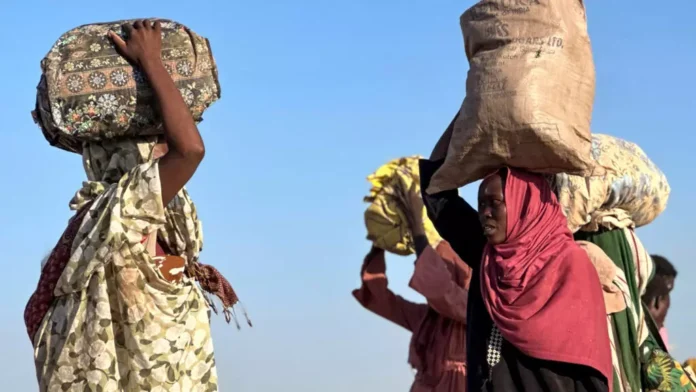When Mohammed Hamdan Dagalo known as (Hemedti) declared a halt to atrocities committed by his Rapid Support Forces (RSF) in El-Fasher, few believed him. Days later, satellite imagery and witness testimony confirmed what Sudanese civilians have come to know too well: his words rarely translate into action. Inside El-Fasher, the killing, starvation, and mass detentions continue unabated.
What began as a political statement of restraint turned into yet another exercise in deception. Reports from human rights organizations and local monitors describe widespread killings on ethnic grounds, arbitrary detentions, torture, and public executions. “Hemedti’s ceasefire is a mirage,” said one Sudanese analyst. “He talks reconciliation while his men tighten the noose.”
Ethnic targeting and information blackout
Military and humanitarian observers confirm that the RSF continues ethnically targeted attacks despite global outrage. Since capturing El-Fasher on October 26 after months of siege, the paramilitary group has obstructed aid, cut communications, and imposed near-total isolation on the city. Analysts argue Hemedti’s ceasefire announcement was intended to deflect international scrutiny and buy time to consolidate control.
Witnesses report that RSF fighters have stopped sharing videos of their atrocities, while forcing residents to remain indoors under threat of execution. “No one can leave. No one can speak,” said a survivor who escaped through Qarni. “If you’re caught, you disappear.”
Evidence from above
The Yale Humanitarian Research Lab released satellite images showing massive gatherings of displaced civilians near Qarni, northwest of El-Fasher. “These images indicate sustained displacement patterns and severe human rights violations,” said the lab’s latest brief.
Meanwhile, the Sudanese Doctors’ Network reported that thousands of civilians remain trapped inside El-Fasher. RSF forces, the group said, have confiscated all transportation and blocked humanitarian aid. Those attempting to flee were either shot or forcibly returned, some suffering from malnutrition and untreated wounds. “This is a humanitarian catastrophe in motion,” the network stated.
Médecins Sans Frontières (Doctors Without Borders) warned that the ban on movement, coupled with collapsing healthcare infrastructure and deliberate targeting of hospitals, risk turning El-Fasher into “a death zone sealed from the world.”
Witnesses describe horror
According to survivors, RSF fighters have separated civilians by gender, age, and ethnicity, detaining many for ransom that sometimes reached hundreds of dollars. “They took our boys, beat them, and told us we were slaves,” one mother told a Sudanese NGO after fleeing to Tawila.
The regional government in Darfur reported more than 2,200 deaths in El-Fasher since October 26, including women and children. Hospitals, mosques, and refugee centers were hit by gunfire, often deliberately. Local officials say over 390,000 people have fled in recent weeks, with thousands more missing.
The International Organization for Migration estimates that more than 8,000 people fled the city over a single weekend, though most never reached safety. “We expected hundreds of thousands to come,” said Shashwat Saraf, Sudan country director for the Norwegian Refugee Council, “but few have survived the journey.”
Global silence and foreign ties
Despite mounting evidence, the international response remains muted. Diplomats acknowledge that Hemedti’s foreign alliances complicate pressure efforts. The RSF has long been linked to gold smuggling routes that fund its operations, as well as military coordination with groups in Libya, Chad, and the Central African Republic. Western intelligence agencies have also tracked cooperation between the RSF and elements of Russia’s Wagner Group in securing Sudanese gold exports—schemes that help sustain the war financially.
Gulf states, particularly the United Arab Emirates, have been accused of indirectly enabling the conflict by supplying funds that flow into RSF-affiliated networks through illicit trade. The UAE denies arming any party in Sudan, though multiple reports by the UN Panel of Experts suggest otherwise.
A senior humanitarian observer told Al Jazeera English, “Sudan’s tragedy is not only a war between two generals. It’s a proxy struggle fueled by regional money and international indifference.”
A country unravels
The wider war between the Sudanese Armed Forces (SAF) and the RSF began in April 2023, collapsing one of Africa’s largest nations into chaos. The conflict has killed tens of thousands and displaced nearly 13 million people—creating one of the world’s worst humanitarian crises.
Today, the RSF controls all five states of Darfur, while the army holds thirteen others, including Khartoum. The line dividing them cuts across a shattered landscape of famine, sexual violence, and ethnic cleansing.
El-Fasher, once the administrative jewel of Darfur, now stands as the symbol of Sudan’s unraveling—its people trapped between a commander’s false promises and a world too weary to act.


